INTERVIEW: Max Minghella on his Debut Feature TEEN SPIRIT
It’s always pretty exciting when a new filmmaker comes around with their directing debut, but it’s even more exciting when it’s an actor we’ve known for ten or more years making the transition behind the camera.
That’s the case with actor Max Minghella, son of the late Oscar-winning filmmaker Anthony Minghella (The Talented Mr. Ripley), who had been acting in various films and television shows for nearly fifteen years.
His debut feature Teen Spiritstars Elle Fanning as Violet, a Polish teenager living on England’s Isle of Wight who has dreams of getting out of her humdrum village. Her opportunity comes in the form of the national talent show that’s coming through town for auditions. She gets help from an unlikely ally in a former Croatian opera singer named Vlad (Zlatko Buric), who offers to help Violet as long as he can be her manager. Vlad puts Violet through rigorous training to prepare for the audition, and together, they make their way through a wonderful story of trying to overcome the odds to find success and even fame.
The Beat got on the phone with the younger Minghella earlier this week to talk about making his directorial debut and also to get some thoughts on the third season of Hulu’s The Handmaid’s Tale, on which he stars.
THE BEAT: I think I read somewhere that “Teen Spirit” was going to be Polish and set in Poland, so how did you transition the story to the Isle of Wight? Was that just easier to get financing?
MAX MINGHELLA: It really was to do with the casting, and Elle, to be honest. We just couldn’t find an actor – it was really difficult. We were trying to find somebody who can sing, dance and act and speak two languages and play the age range and be able to carry every frame of the movie. It was just like one thing too many on the quota list. We just kind of got into a panic and didn’t really know what to do. We announced the movie without an actor, which was dangerous and naïve, and then Elle kind of reached out to us. I don’t know how much she knew about the project, but she knew that there was a music element to the film. I went and sat down with her, and it was very clear, once I started talking to her, that she was not only going to end up being in the movie but was probably the only person who could play the part. She had so many brilliant ideas about how we could reshape it slightly, so it made sense as an English language movie, and all of those ideas I think massively improved the film, so it was all kind of fortuitous, I think.
THE BEAT: Had you already cast [Polish actress] Agnieszka Grochowska even before Elle?
MINGHELLA: Oh, no, no. I cast Zlatko [Buric], because the first seed of this whole idea, to be honest, the part was written for him, and the movie was built around him. So I kind of knew that he was going to be in the movie, but no, I didn’t cast anybody else yet.
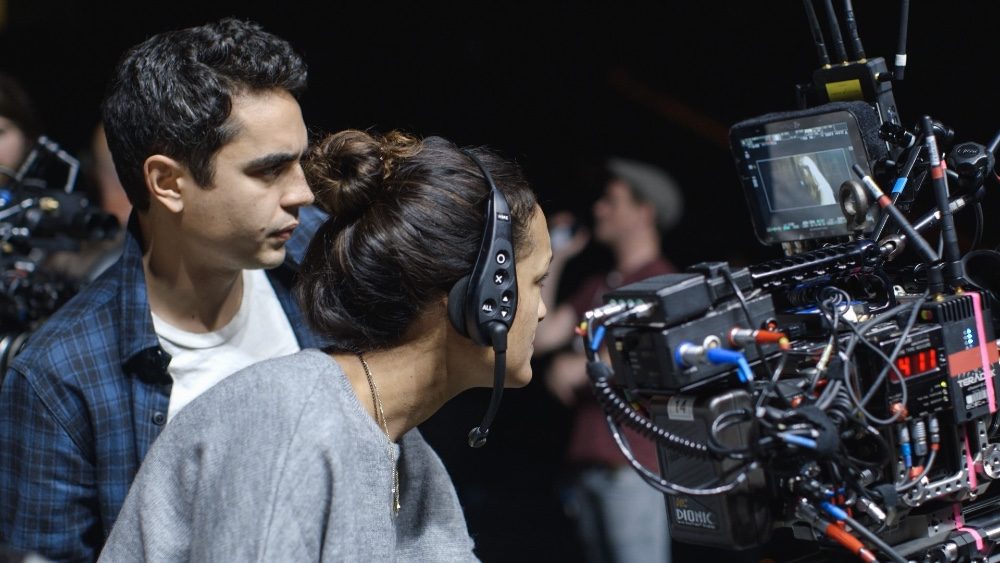
THE BEAT: Had you been wanting to get into directing for a long time? Obviously, your father was a very well-respected filmmaker, a legend, so there was a lot of pressure when you decided to go into directing yourself?
MINGHELLA: I don’t know. It’s something I really enjoy doing, man. I’ve been playing around with cameras since before we first spoke. [Note: this last line is in reference to me mentioning that the last time I spoke to him was for his acting debut in 2005’s Bee Season.] It’s something that I’ve always had as a hobby, I guess. It’s like my main passion and joy in life, so making a movie on a slightly bigger scale just feels even more joyous and exciting.
THE BEAT: I was also impressed by your screenplay and the decision to tell the story of a teenage girl. Last year, I remember Bo Burnham did “Eighth Grade”….
MINGHELLA: That was astonishing. I’m obsessed with that movie.
THE BEAT: It’s interesting to me because you don’t think of a 30-something male director wanting to tell that kind of story about a teenage girl’s journey.
MINGHELLA: To go back to your earlier point, I did start writing this quite a long time ago, so I was closer to my youth [laughs] then I am now, but I think the film has also evolved over the last ten years. And yet, it has a young female protagonist, but I think the film is sort of filled with all of my neuroses. I’m not somebody who is in therapy and probably should be in therapy, but I guess writing and making stuff is some form of self-analysis.
THE BEAT: You mentioned that the character of Vlad and Zlatko was the beginning of this…
MINGHELLA: Yes, very much.
THE BEAT: How did you meet Zlatko and what made you want to set this around him?
MINGHELLA: I knew that I wanted this fairy tale element to it, or just slightly Cindarella-ey through line. I thought, if you’re going to do a fairy godmother, he’s probably going to be the most interesting way of doing that. He also just has so much heart, and there’s nothing lascivious about him, and this is a movie about a platonic relationship, and I didn’t want that to be confused ever. There’s just nothing about Vlad or Zlatko’s performance that makes you question his moral center.
THE BEAT: I remember him from Nicolas Refn’s “Pusher Trilogy,” which I hadn’t seen in a while, so it was nice to see him in a very different type of movie and role.
MINGHELLA: Yeah, it’s so nice getting to see him playing a lovely person.
THE BEAT: As far as Elle’s singing… I have to be honest that when I heard about this movie, I decided not to read too much about it, because I try not to read too much about the movies I see in advance…
MINGHELLA: Oh, great. We love that.
THE BEAT: So when she started singing in the bar, I was kind of shocked, because she really can sing… or at least I assume that’s her singing. I don’t know if she’s sung in anything before, but what was involved with getting her singing to the level where she can be believable as a contestant on this show?
MINGHELLA: Well, she came in with a pretty astonishing voice, I’ve got to say. I don’t think we would have felt confident hiring somebody who couldn’t perform. It’s literally a musical. It would be nice to have someone who can do it. But she worked so hard on top of that. She really came in strong, and then I think she did three months prep every day before she even came to England. When we were shooting, she had vocal training almost every day after work, so it was a huge commitment, and it’s a massive testament to her discipline.
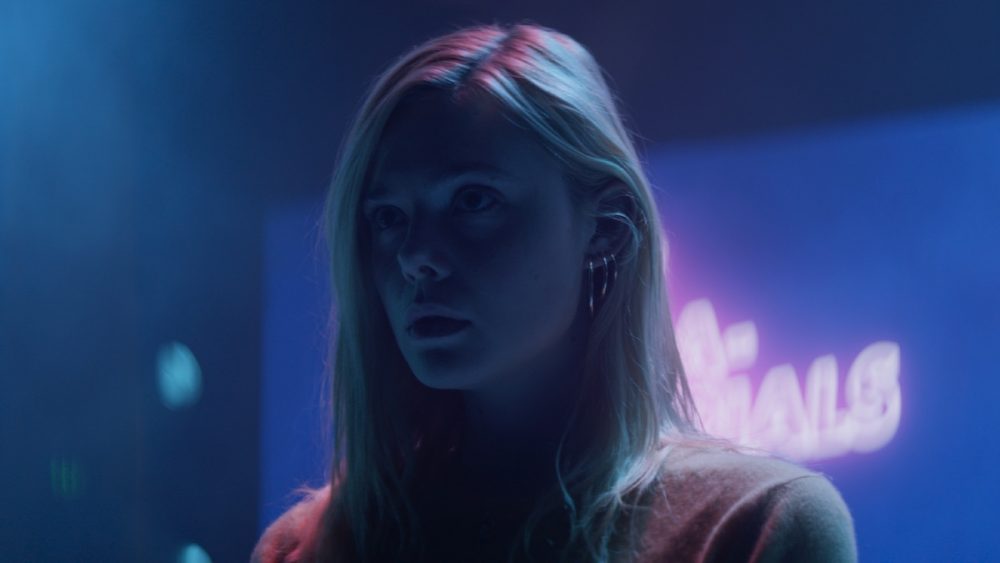
THE BEAT: She’s also been in quite a few England-set movies lately so she has her British accent down, so has she gotten to the point where she can come in and out of it fairly easily?
MINGHELLA: Oh, yeah. She didn’t stay in accent. Also, what’s kind of interesting about this character is that it’s not her first language, so we talked a lot about that, and I worked a lot with her dialect coach on that. It would have felt odd to me if she sounded completely lived-in and authentic. There’s something kind of posh about her accent. Basically, what Sandra, her dialect coach did, was she found a bunch of Polish kids that emigrated the same time that Violet would have, so we literally just tried to copy what the reality would be. It was interesting to find that a lot of those girls had adopted a slightly more arty accent.
THE BEAT: Going by her singing, I’m surprised she hasn’t done more musicals, and they’re making so many movie musicals, so I’m sure after this movie, someone is going to see her in this and start casting her in more musicals.
MINGHELLA: I hope so. I mean, she’s so extraordinary at it, and she performed all of this live. All of her vocal recordings, we took from the shoot itself, which is an amazing advantage to have as a director and have it in the edit. I think there’s an authenticity to it that you can really feel. I agree with you. I think she has a long career ahead as a musical performer in any capacity.
THE BEAT: Had you spent a lot of time coming up with a backstory for Violet or did you let Elle do some of that as well? Did you have a pretty good idea of where she came from before we meet her?
MINGHELLA: Actually, it changed a lot once Elle came on board. I mean, it felt exciting trying to absorb some of her real life into this person and increase the overlap. I think Elle would say that this was the closest to her that she’s gotten to be on-screen, and we really talked a lot about who this person is, and also, tried to acknowledge a little bit about where she was in her real life, too.
THE BEAT: I also was impressed by the film’s authentic view of smalltown life, especially on the Isle of Wight, which seems like a slightly esoteric locale. What were you and Elle able to bring to that considering that you both have been making movies for a long time? Was there stuff from your own life to draw from?
MINGHELLA: Well, my father actually grew up on the Isle of Wight, so I have a history with that part of the world, but I dunno. I just like things to feel authentic. I know that the movie has a kind of dream-like quality to it, but also, at the same time, I think it’s also hyper-naturalistic, so there’s a funny dichotomy there.
THE BEAT: You have a bit of a ringer involved in the movie, because you have Marius DeVries (“Moulin Rouge”) doing the music. At what point did you bring him in and how did you two decide which songs she would sing. I wasn’t that familiar with the songs and assumed they were originals, although I found later one is a Robyn song.
MINGHELLA: Great, that’s good. I love hearing that. No, the songs were all written into the script, so it’s been a long-standing plan but to answer your question about Marius’ stuff, I really got to piggyback this film off the success of La La Land, and [producer] Fred Berger’s relationships with all of these brilliant people that none of them would ever want to talk to me or read my script otherwise. We first talked to Fred about this project a long, long time ago. It was before he even had a draft of La La Land– I’m not sure that was even a real movie yet. He went off and made that, and it turned into something that really worked and connected with people. Everyone just loved working with him so much on that film that they really wanted to dive back into a musical project with him. It was all very serendipitous. I’m very grateful for that, and I owe him a huge amount.
THE BEAT: Because “Teen Spirit” is actually a television show, you have to recreate that and make it believable. What was involved with creating that show from scratch and make it seem like something that’s been around forever like “American Idol”?
MINGHELLA: Of course, you want it to feel real and all that stuff, but I was so much more interested in the behind-the-scenes world and making that feel authentic, because that’s much harder to reference. There are four or five shows on TV that we can all point to, and there’s a clear visual concept for what a TV reality music show composition should look like. Getting to have an understanding of what the green room might look like or what the hotel rooms might look like or any of those backstage space are was the thing I was most keen and honestly, fascinated, to nail and get right.
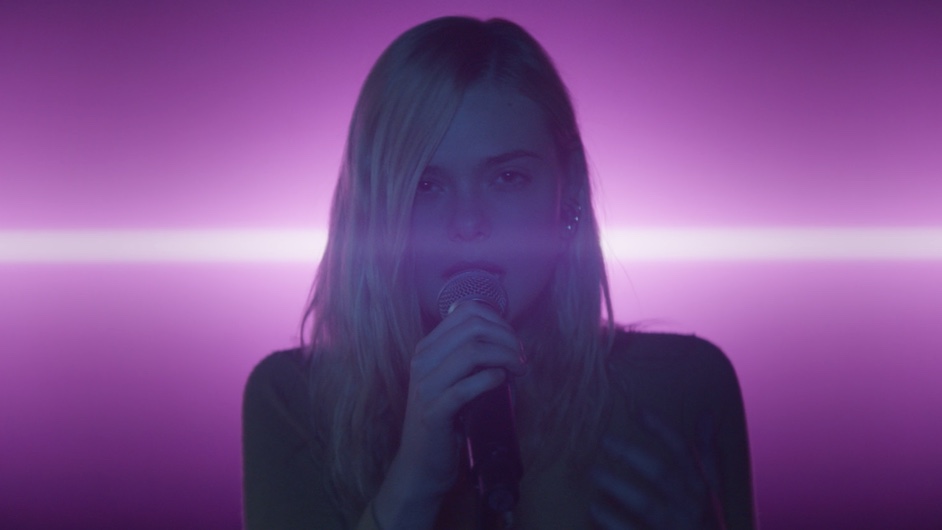
THE BEAT: I also like seeing Rebecca Hall as the “Simon Cowell” of the show. It was a small role but she was great in it.
MINGHELLA: Yeah, she’s incredible. I have no idea why she agreed to do the movie, but God bless her, and I’m so grateful, because it’s an amazing piece of acting.
THE BEAT: You’ve been doing “Handmaid’s Tale” for the last few years. Was it hard to juggle the schedule for that and make this movie? Did it take longer to finish the post because you had obligations to the show?
MINGHELLA: That’s a very observant question. I mean, what basically happened was that we finished shooting the movie and then I went and shot Season 2 of the show, so I took a hiatus for a long time, like six months, away from the movie before I really committed to the edit. That was just a lovely gift, and I don’t think I’ll ever get that privilege again of having that time built into the schedule. It was like a very lucky thing, but it just meant that when you come back to look at it, you’re completely objective already since it’s been six months since you had to be around this film and the world of it. That was very helpful. Even though it ended up taking longer, it also expedited things, too.
THE BEAT: I think a lot of times, filmmakers are forced to rush to make a release date, and you don’t have that time to step back, so that was a nice bonus.
MINGHELLA: Oh, yeah. It was great, man, but it will never happen again, but thank God it happened once.
THE BEAT: Have you finished shooting Season 3 of “Handmaid’s Tale” already or is that still in progress?
MINGHELLA: We are close. We’re close. We have another month or so.
THE BEAT: I’m amazed by what they’ve gotten out of Margaret Atwood’s book, so do you think there’s enough material for them keeping going to a fourth, fifth season or beyond?
MINGHELLA: I’m very confident that they would stop if they ever felt like they’ve run out of material, but it seems to me just as an observer that there’s a gigantic amount of worlds to explore. There’s so many different elements to the world of it, we don’t really… It’s so funny… I often get episodes and go, “Oh, yes, of course. There’s a whole other country out there.” There’s so much of the world that hasn’t even been explored or referenced yet, so I’m actually very excited about where it’s going to go, and certainly, Season 3 is very rich and surprising.
THE BEAT: Are you happy with the trajectory your character takes in the next season?
MINGHELLA: Yeah, yeah. I just love playing this character, first and foremost. I didn’t anticipate when I started doing the show that it would last and keep going, so it was definitely the longest I’ve played anybody, and I’m very happy that it’s this person that I’m playing, because he’s very easy for me to understand and relate to.
Teen Spirit opens in select cities on Friday, April 12, and will expand nationwide on April 19.


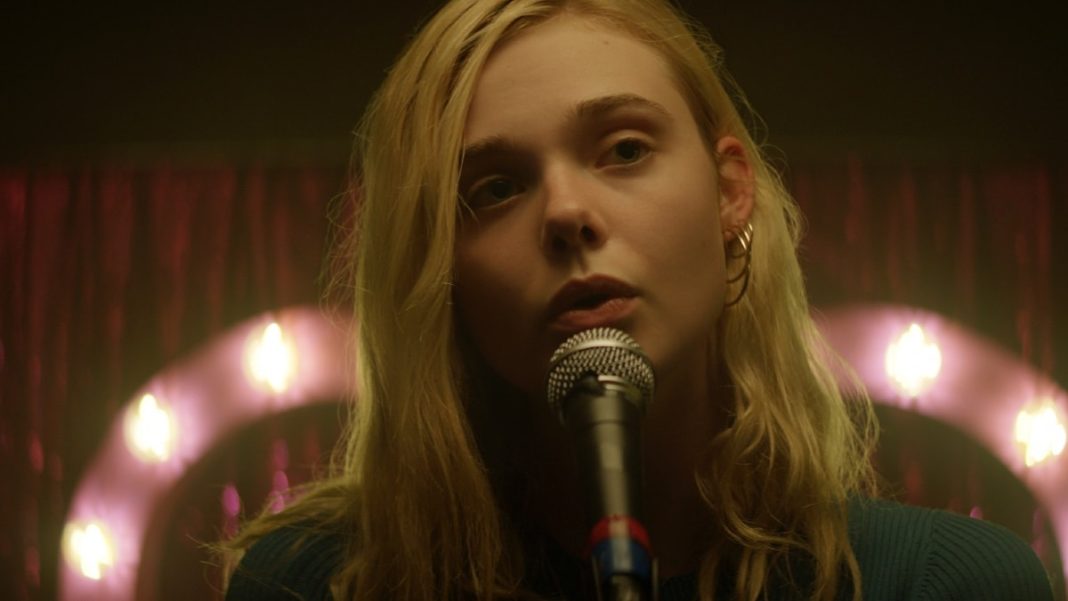
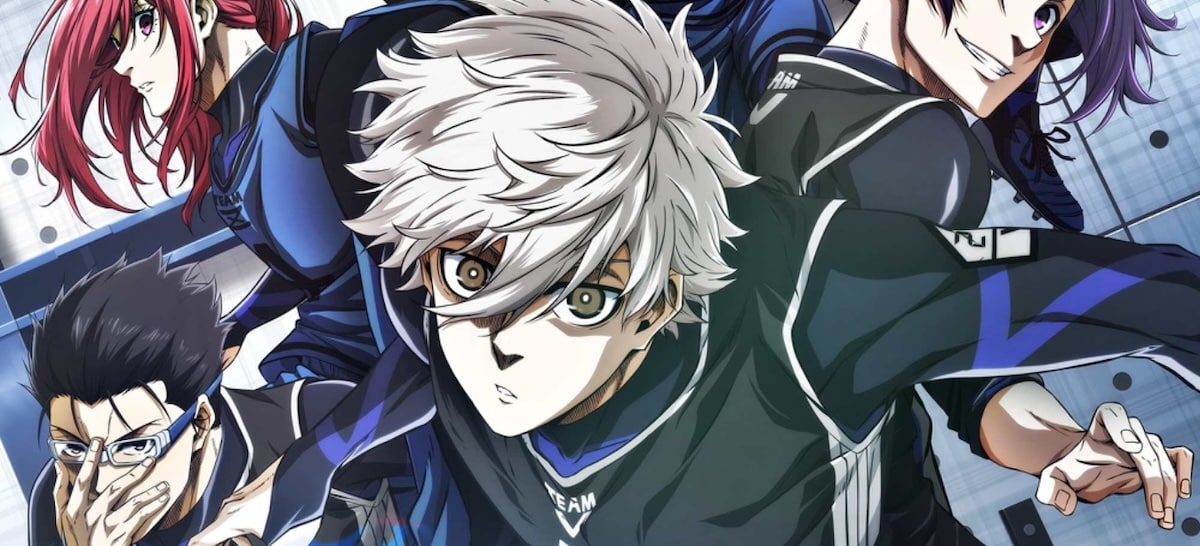

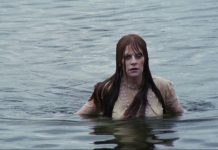


Comments are closed.